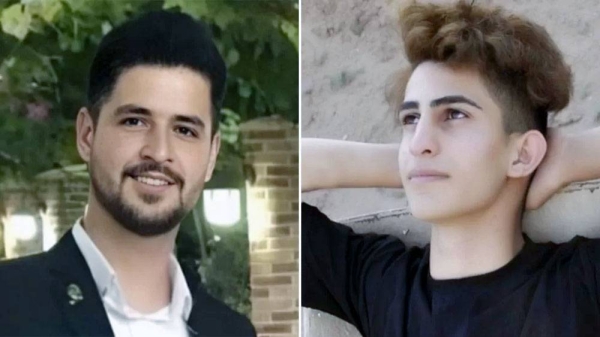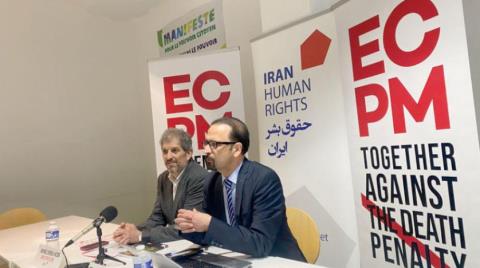
Dozens of people demonstrated outside a prison in Iran overnight amid reports authorities were preparing to execute another two anti-government protesters.
Opposition activists posted videos showing people chanting slogans in front of Rajai Shahr jail in the city of Karaj.
The mother of Mohammad Ghobadlou, one of the two men at risk of execution, appealed for clemency at the gathering. Two protesters were hanged on Saturday, prompting international condemnation.
The UN human rights office deplored the “shocking” executions of Mohammad Mahdi Karami and Seyed Mohammad Hosseini, which it said followed “unfair trials based on forced confessions”.
A Revolutionary Court found the men guilty of “corruption on Earth” over their alleged involvement in the killing of a member of the paramilitary Basij force in Karaj in November. Both denied the charge and said they were tortured.
They were the third and fourth people to be executed in connection with the protests that erupted in September following the death in custody of a woman detained by morality police for allegedly wearing her hijab “improperly”.
Authorities have portrayed them as “riots” and responded with lethal force.
So far, at least 519 protesters and 68 security personnel have been killed in the unrest, according to the Human Rights Activists’ News Agency (HRANA).
It says that another 19,290 protesters have been arrested and that 111 of them are believed to “under the impending threat of a death sentence”, having been convicted of, or charged with, capital offenses.
People gathered outside Rajai Shahr prison on Sunday night after activists warned that Ghobadlou and Boroughani had been transferred to solitary confinement in preparation for execution.
Opposition activist collective 1500 Tasvir published videos showing a crowd chanting slogans warning authorities against proceeding with the executions.
Shouts included “I will kill who has killed my brother” and “This is the last warning. If you execute [them] there will be an uprising/revolt.”
Ghobadlou’s mother, who has previously said her son has bipolar disorder, was filmed telling the crowd that 50 doctors had signed a petition calling on the judiciary chief to establish a committee to review her son’s mental health.
“If he believed in God, he would have responded to these 50 doctors,” she said, asserting that her son is “ill”.
She also claimed that the policeman who he is accused of killing was “martyred somewhere else”.
1500 Tasvir also posted videos purportedly from the area around the prison in which gunshots could be heard.
The activist collective declared later on Monday that the protest had stopped the executions “at least up to this moment”.
Ghobadlou, 22, had his death sentence upheld by the Supreme Court on Dec. 24. He was convicted of “enmity against God” after being accused of driving into a group of policemen during a protest in Tehran in September, killing one of them and injuring others.
He stood trial without his chosen lawyer, who said the prosecution had relied other flawed evidence. Amnesty International also said it was concerned that he was subjected to torture or ill-treatment in custody, citing a forensic report that pointed to bruising and injuries on his arm, elbow and shoulder blade.
Mohammad Boroughani, 19, was tried alongside Ghobadlou and was also convicted of “enmity against God”.
He was accused of allegedly wielding a machete, setting fire to a provincial government building and injuring a security officer. He was also accused of “encouraging” others to participate in protests via social media.
Amnesty International said he was found guilty after proceedings that “bore no resemblance to a meaningful judicial trial”.
In a separate development on Monday, the judiciary announced that a court in Isfahan had sentenced to death three people over an attack during protests in the city on Nov. 16 in which three security personnel were shot dead.
Saleh Mirbasheri Boltaqi, Majid Kazemi Sheikh-Shabani, and Saeed Yaqoubi Kordsofla were convicted of “enmity against God”.
Two other defendants were sentenced to prison over their alleged involvement in the attack, including professional footballer Amir Nasr-Azadani. Nasr-Azadani, 26, was jailed for 16 years after being found guilty of three charges including “assisting in enmity against God”. — BBC












